



One autumn morning in 2023, a young Nepali man by the name of Bista Prakash sat cross-legged at his home altar. Nearby, his parents were preparing for puja, one of the major Hindu rituals of worship. Offerings of mangoes, bananas, and a few hundred rupee notes lay before an image of Shiva and a statue of Ganesh decorated with a necklace of marigolds that Prakash’s mother had made the day before. Prakash looked around the room in a daze, his ears ringing, his thoughts a mess. He still couldn’t believe that he had managed to escape from Russia.
That morning, deities Shiva and Ganesh received a rather unusual prayer from the Prakash family. They asked the gods to cleanse Bista’s karma of the murders he had committed and help him forget all about it. Only weeks earlier, the 25-year-old was fighting in the Russian army and killing Ukrainians. He didn’t even know how many people he had killed, estimating the figure to be between 10 and 50. After completing the ritual, he rose to his feet in full confidence that his karma was now clean. Truth be told, Prakash did not suffer from pangs of consciousness. But his war wounds, the nightmares, and the fear that his Russian commanders would find him and drag him back to the front line, continued to torment him until the day in May when we met.
Prakash meets me at a bus stop and takes me for a long walk back to his home — a rented room on the outskirts of Kathmandu. He is wearing black sweatpants and a blue sports jumper. He limps heavily on his right leg and speaks quietly, barely moving his lips.
The room, which costs €34 a month, is Prakash’s home while he undergoes treatment at the nearby hospital for injuries he sustained fighting another country’s war. Though the Russian authorities promised him a significant financial reward, Prakash has not seen most of that money and his brother helps him pay for his accommodation.
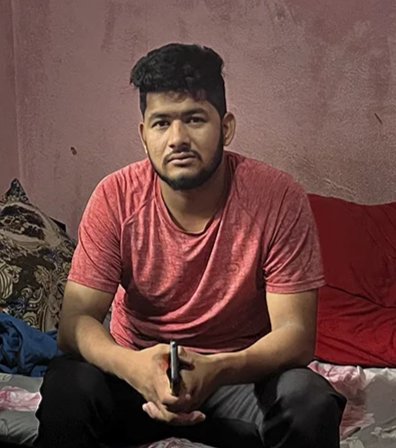
Bista Prakash. Photo: Irina Kravtsova / Novaya Gazeta Europe
Prakash lives on the ground floor of a grey concrete house — in a tiny, dimly lit room with an old bed, a table, a chair, and a two-plate electric hob. There’s only one shower for three floors. The communal restroom, similar to those at gas stations, is just opposite his room.
Prakash grew up in a poor family in the small town of Dailekh. His mother is a housekeeper, while his father was always seeking work in town, accepting whatever jobs he could find. Oftentimes, he found nothing.
Landlocked between India and China, Nepal is one of the poorest countries in South Asia. Its population currently exceeds 31 million and continues to grow — and with it grows the unemployment rate.
Prakash decided to go to Russia for a “change of scenery” after a prolonged depression — his wife had committed suicide just six months after their marriage, and he never understood why.
“For months after that, I hardly ate and just cried all day long, unable to get out of bed,” he says.
One of his cousins had gone to Russia seven years earlier and got a degree from a Moscow university and then a job at tech giant Yandex. Prakash decided to follow in his footsteps. He took a high-interest loan from a local moneylender and paid an “agent” 1 million Nepalese rupees (almost €6,800) to help him secure a Russian visa, pay the necessary fees, and buy plane tickets.
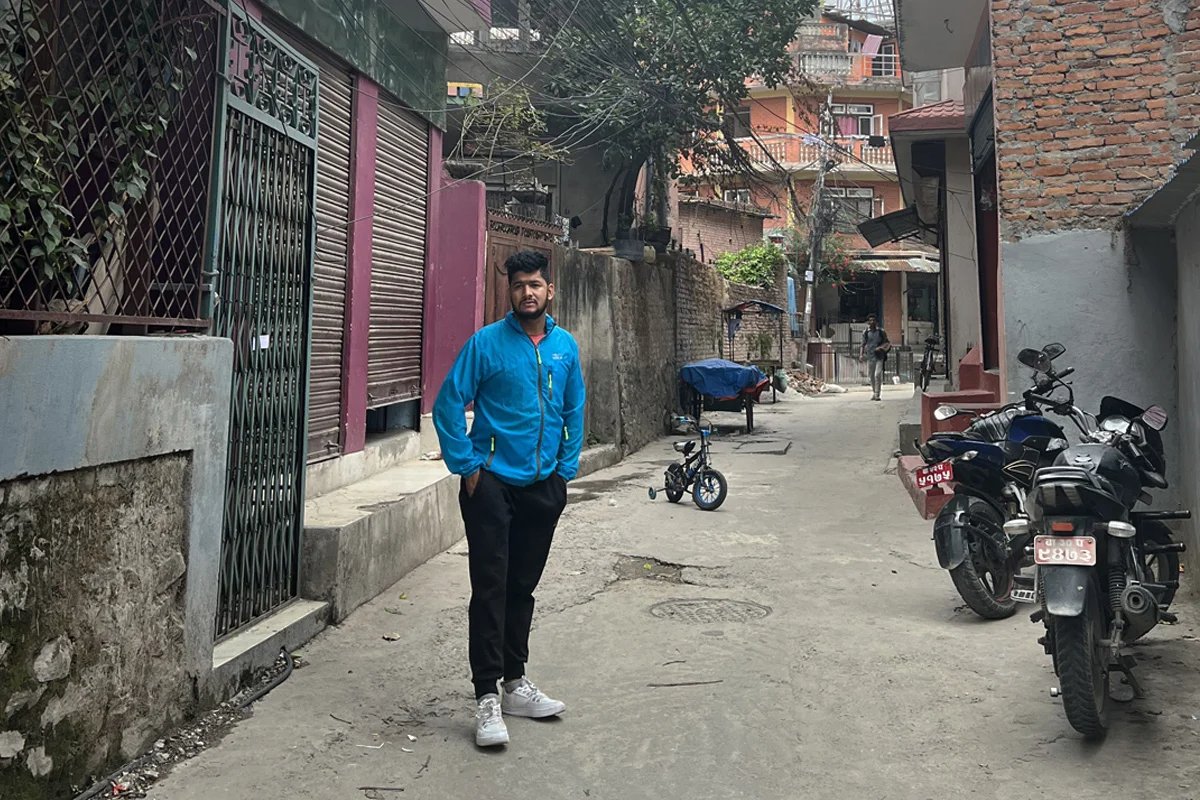
Bista Prakash. Photo: Irina Kravtsova / Novaya Gazeta Europe
After arriving in Russia in June 2023, Prakash shared a one-room flat with seven other Nepalis he had met on WhatsApp the previous day. He was required to study Russian for a year before enrolling in the department he was interested in. To pay off his debts and fund his accommodation and studies in Moscow, Prakash planned to get a job, but soon discovered that his type of visa did not permit him to work in Russia.
He got a cash-in-hand job scanning goods in the warehouse of a large online retailer. However, at the end of his first month there, his employers refused to pay him, and then soon afterwards, their flat was raided by the police and the Nepalis were arrested for not being registered to live in Moscow.
“We were terribly scared,” says Prakash. “The police treated us like cattle.”
After spending a night in prison, they were told to bribe one of the policemen — 5,000 rubles (€50) each. They paid. That was also when Prakash started receiving calls from his loan shark demanding that he pay back the debt. His panic was growing.
In August, Prakash noticed an advert in a Moscow suburb inviting volunteers to join the Russian army. He photographed it and went to the recruiting office the next day, where he was offered a contract in English. Using Google, he translated it into Nepali and began to read it. However, after he saw the salary — 70,000 to 200,000 rubles a month (€700 to €2,000) — he admits he didn’t worry too much about the small print.
“The offer looked like winning the lottery. Like a dream,” he says, with an embarrassed smile.
Nepalis aren’t required to do compulsory military service and Prakash had never held a gun before, but that didn’t deter him in the least.
“The offer looked like winning the lottery. Like a dream.”
“I didn’t think about it from a moral point of view. For me it was just a job that promised to pay well. And I really needed the money: I had a 1-million-rupee debt,” he says.
Prakash said that he learnt about the war in Ukraine “from international media and TikTok”, and came away with the impression that “both sides were wrong”. “Yes, Russia attacked first, but Ukraine is also killing people. Besides, it was the USA that told Ukraine to fight,” Prakash says.
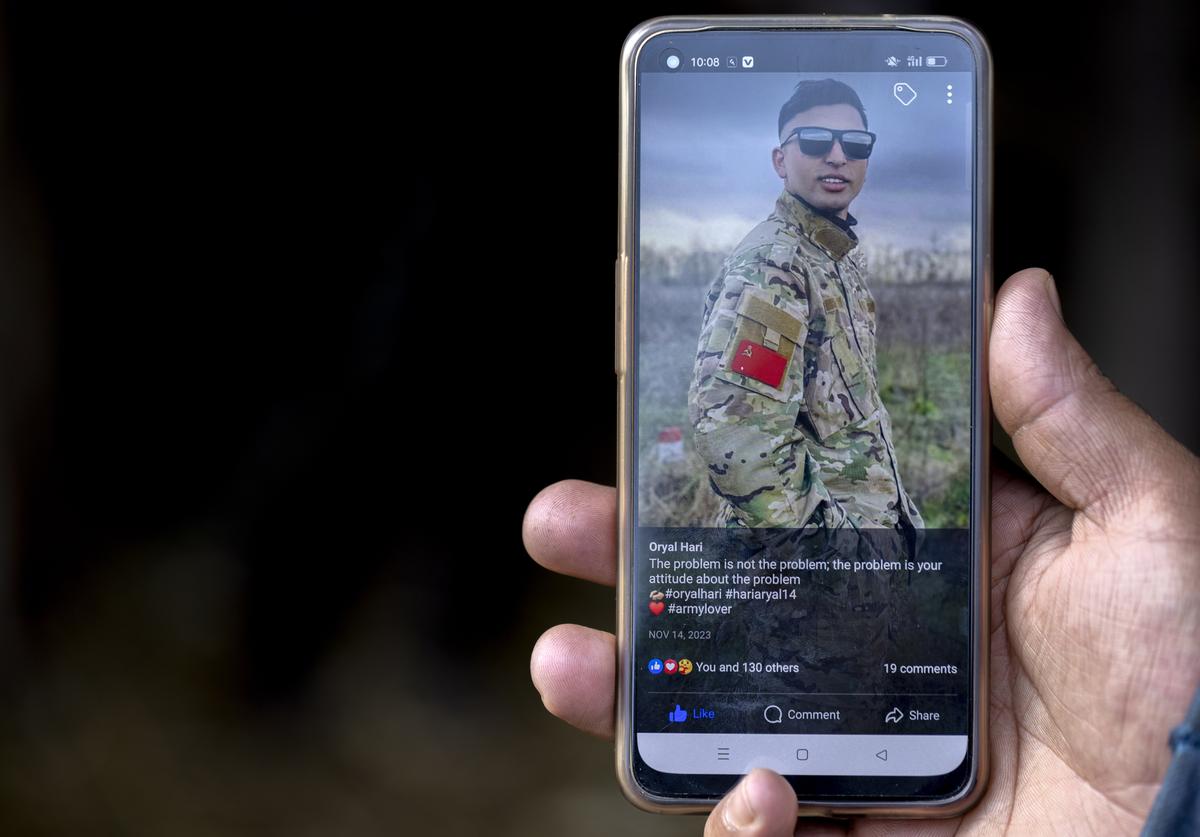
A Facebook post by a Nepali serving in the Russian army. Photo: EPA-EFE / NARENDRA SHRESTHA
Prakash promptly signed a contract with the Russian Defence Ministry and spent three weeks doing his basic training.
Although he took an English test at the recruitment centre, few people he met in the Russian military spoke English themselves. “Except for the word ‘motherfuckers’, which the commanders often used in reference to me and other foreigners. Other than that, they addressed us in Russian and insisted that we answer them in Russian,” he recalls.
Prakash managed to learn only a few basic words in Russian — “a bit”, “left”, “right”, “sorry”, “thank you”, “how are you?”, “everything’s fine”. But he still couldn’t understand his commanding officers, who would start shouting at foreign recruits whenever they were unable to follow orders, he says.
In the training camp, soldiers were often served beef, but Prakash refused to eat it: “The cow is a sacred animal, and my religion doesn’t allow me to eat it.” And he found most of the other food to be so devoid of salt and spices as to be virtually inedible. Oftentimes, he subsisted on tea and bread or biscuits.
Despite these mishaps, Prakash still felt he was on the threshold of a wonderful new life. He posted videos on TikTok which could only be interpreted as him being extremely lucky. In these videos, overlaid with upbeat Nepali folk music, he would lounge contentedly beside a tank, a blade of grass in his mouth, or hang out in the forest hugging his fellow Nepalese soldiers. And for all this, he earned nearly €1,800 a month!
After three weeks at the training camp, Prakash was unexpectedly — for him, at least — sent to the frontline in the Kharkiv region. He admits that when he went there, he “had no idea how scary it would be”.
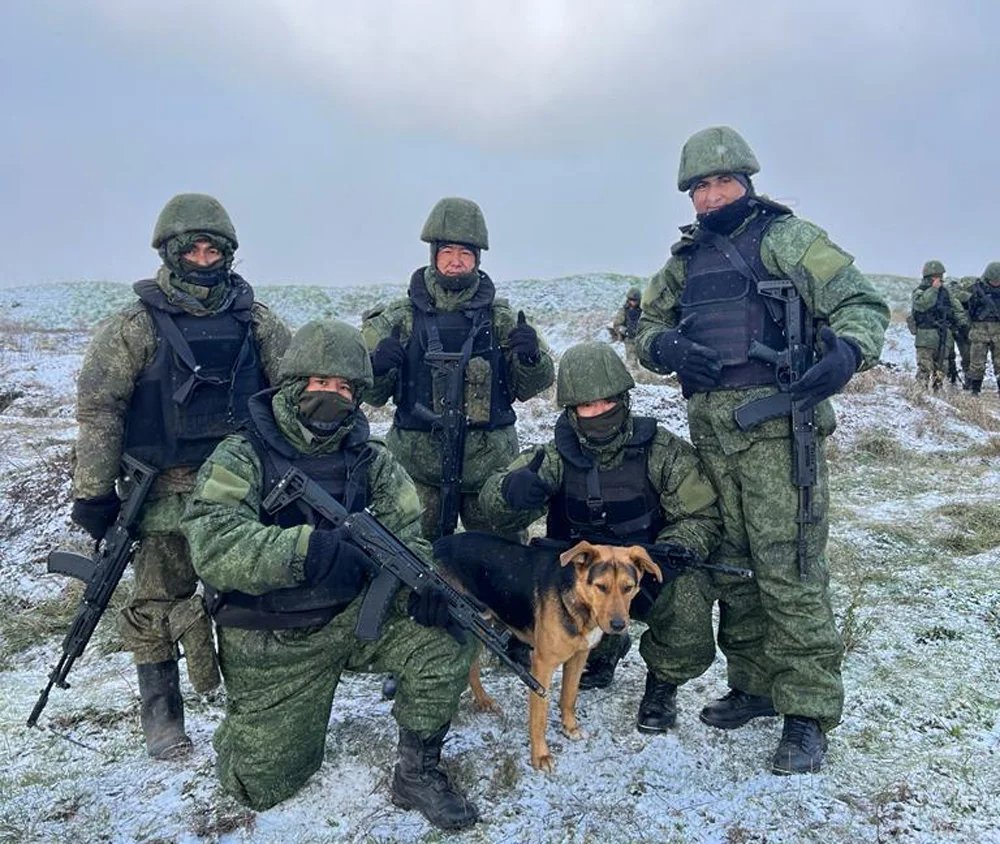
Nepalis in the Russian army. Photo: Activist Kritu Bhandari’s archive
“It’s endless war. Bombs falling everywhere. Explosions. You can’t hear anything. Bullets are whizzing by. It’s scary,” Prakash recalls. “I was sure I would die and never return to Nepal. I begged the Russian commanders to let me go home, but they only got angry.”
“Many of the Nepalis I was there with were killed. Others were terribly injured,” he recalls.
Prakash doesn’t know how many people he killed while he was at the front line. “Maybe 10, maybe 50,” he says calmly. “I shot at them with a rocket-propelled grenade launcher at night and from a long distance. So I couldn’t see exactly how many I killed. I once destroyed a whole lorry with one shot. Who knows how many Ukrainians died in it.”
“I was sure I would die and never return to Nepal. I begged the Russian commanders to let me go home.”
One night in September 2023 — he doesn’t remember the exact date — he was wounded in the foot, shin, and shoulder by a combination of bullets and shrapnel.
“In that moment, I thought I’d lost my legs and my hearing — there was a sudden deafening silence. I thought I was dead,” he recounts.
Prakash received no medical attention for two nights after his injury. He was eventually taken by helicopter to a Russian hospital in a city whose name he does not remember. He shows me his discharge papers, which tell me that it was Belgorod. There, surgeons removed the bullets from his legs, but decided to leave the shrapnel, which was lodged too deeply in his flesh to be extracted easily.
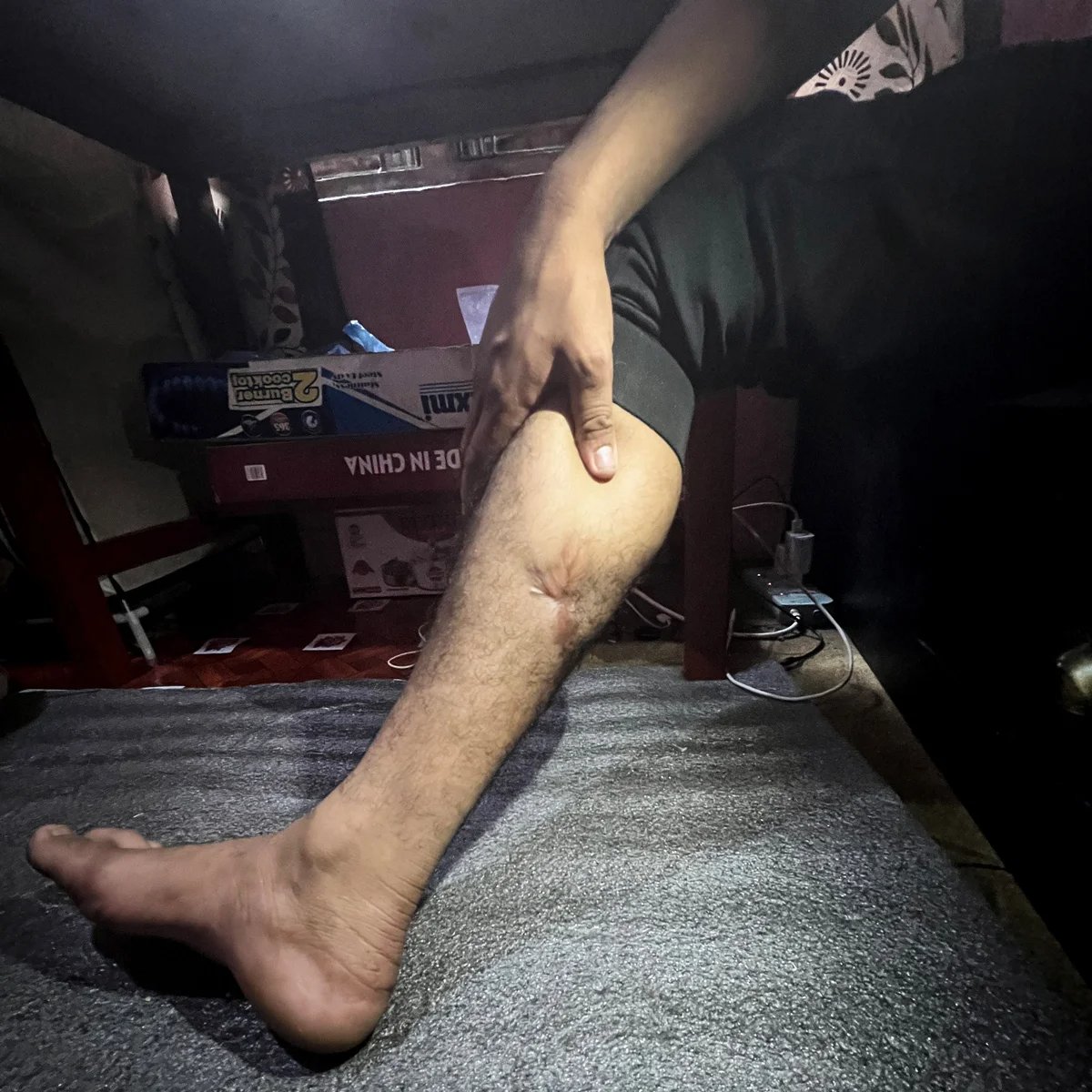
Bista Prakash showing his wounds. Photo: Irina Kravtsova / Novaya Gazeta Europe
The original training camp videos that Prakash posted on TikTok had in the meantime become great promotional material for the Russian military among his fellow countrymen. Many Nepalis wrote to Prakash while he was incommunicado on the frontline to ask him whether the conditions in the Russian army were really that good. Once he finally had access to a phone again, Prakash immediately started making video calls to those who had written to him in which he displayed his wounds and the miserable conditions in the hospital and, unfazed by the doctors and soldiers all around him, discouraged other Nepalis from joining the Russian army.
“Coming here is the worst decision you could make. Few Nepalis return from the front alive.”
“Coming here is the worst decision you could make,” Prakash told them. “Few Nepalis return from the front alive. This is partly because they don’t understand Russian and hence the commands of their superiors.” Prakash says that he managed to dissuade some 200 Nepalis from travelling to Russia.
In late November, a doctor told Prakash that since he could put weight on his foot again he would soon be sent back to the front. “I was terribly frightened. I thought I would die if they sent me there a second time,” he recalls.
All this time, he was sure that the worst was over: he would recuperate, be discharged from the army due to health issues, and receive a significant payment for his injury.
Two days later, in the early hours of the morning, Prakash slipped on some civilian clothing and slipped out into the street, trying to look as casual as possible. Once out of the hospital grounds, he walked for 30 minutes without turning back. He then managed to persuade a passing driver to take him to Moscow for 100,000 rubles (€1,000), and spent the next 12 hours en route to the Russian capital, “praying incessantly” that the hospital wouldn’t already have begun looking for him.
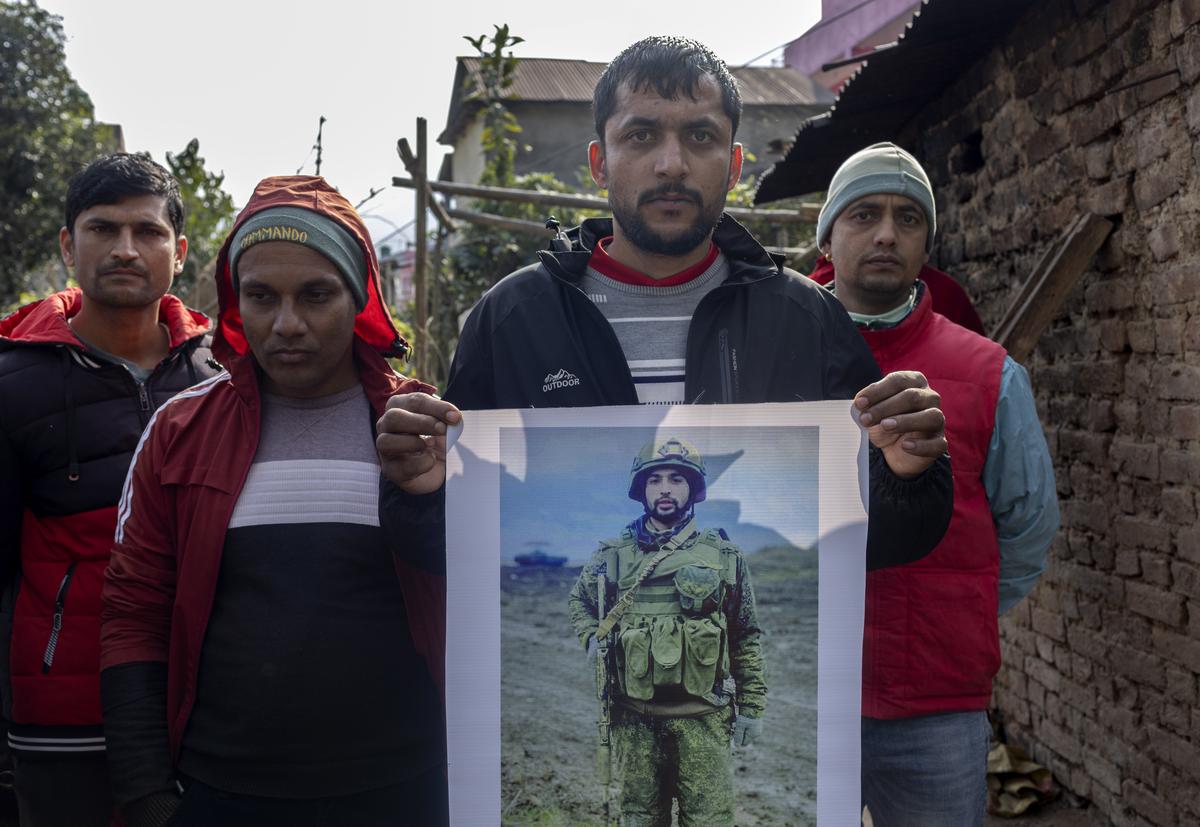
A group of Nepalis attend the final rites of a friend who died fighting for the Russian military in Ukraine, Walling, Syangja district, Nepal, 19 January 2024. Photo: EPA-EFE / NARENDRA SHRESTHA
As Prakash’s commanding officer still had his documents, upon reaching Moscow he went straight to the Nepalese embassy, where he was issued a new passport within days. But once again he had to seek help from his “agent”, who charged 670,000 rupees — €4,550 — for his services.
Nepalis who decide to join the Russian army face an impossible dilemma, having to break Nepalese law to go to Russia and Russian law to return home. After entering Russia on a visitor’s visa, which allows them to stay in the country for 90 days, they sign a year-long contract with the Russian army, although their visa expires in mere months, rendering their status illegal. Once again, “agents” step in, providing them with the necessary documents and an air ticket to India. From there, the Nepalis can safely return to Kathmandu.
After returning from the war, Prakash was forced to rent a shabby room on the outskirts of Kathmandu to be able to receive treatment at the local hospital.
Since Prakash’s return from the war, doctors have been monitoring the effects of the shrapnel lodged deep in his body, which have the potential to cause cancer. Should the doctors determine that the metals are indeed having a negative effect, they will have to perform invasive surgery to remove them.
“I dream I’m back at the front. Explosions, limbs getting blown off. I dream of friends who died in front of my eyes. And I wake up in horror and a cold sweat.”
Prakash was paid about €5,500 for four months of service in the Russian army, almost two months of which he spent in hospital. He spent all that money to return home. While in hospital, Prakash applied to receive compensation for his injury, but so far Russia has not paid him, and he hasn’t even begun paying off his debt.
“It’s impossible to earn such money in Nepal, so I will have to go abroad again to pay off my debts. But I’ll think about it in six months.”
Prakash has nightmares almost every night.
“I dream I’m back at the front. Explosions, limbs getting blown off. I dream of friends who died in front of my eyes. And I wake up in horror and a cold sweat,” he admits. “I went to Russia to cope with the stress of my wife’s suicide. But that trauma was compounded by another one, and now my life is unbearable.”
Sometimes Prakash spends all day and night without leaving his tiny room.
“I scroll through TikTok, stare at the wall, sleep, watch some more videos, and lie in silence. That’s how my days go by,” he says.
The Russian government has banned independent media. We were forced to leave our country in order to keep doing our job, telling our readers about what is going on Russia, Ukraine and Europe.
We will continue fighting against warfare and dictatorship. We believe that freedom of speech is the most efficient antidote against tyranny. Support us financially to help us fight for peace and freedom.
By clicking the Support button, you agree to the processing of your personal data.
To cancel a regular donation, please write to [email protected]
VPNovaya
Help Russians and Belarusians Access the Truth
